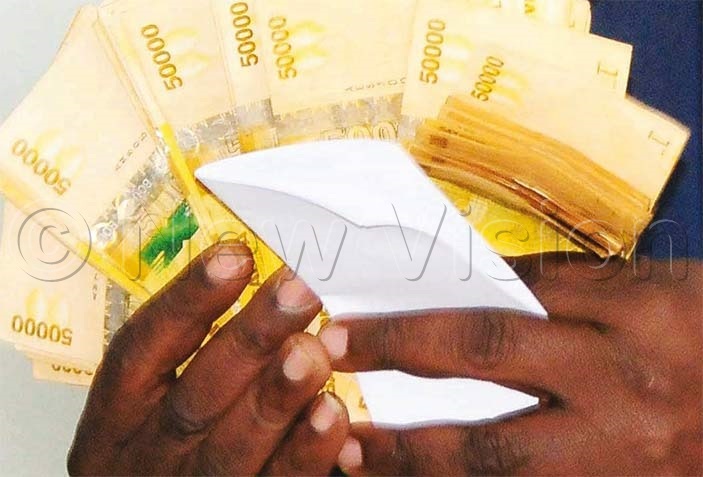Govt suspends all non-salary payments
The priority sectors are State House, defence ministry, and the Electoral Commission.
GOVERNMENT|MINISTRIES|SALARIES
The Accountant General has directed all accounting officers of government ministries and departments to defer payments for the month of November and December, until further notice from the Secretary to the Treasury.
In an internal memo, dated November 11, Accountant General Lawrence Ssemakula said given the country's cash flow position for the months of November and December, only payment for the five priority sectors should be made.
The priority sectors are State House, defence ministry, and the Electoral Commission.
Ssemakula also directed that only payments for wages, salaries, pension, and gratuity should also be made during the two months.
For statutory obligations under vote 130 (Treasury Operations), the Accountant General said the payments should be made in a phased manner.
He, however, did not outline the obligations.
A source said some of the payments that will be affected include payment to commercial contractors; payment for the consumption of public utilities, such as electricity water, and telephone; payment of interest or principal on government debt or other liabilities.
When Parliament appropriates funds to a sector, the finance ministry, through quarterly releases, issues a cash limit.
However, according to sources, the sector can request for an increase of the cash limit, depending on the appropriated budget. Sources said the move to defer payments follows a meeting among the Permanent Secretary of the finance ministry, the director budget, and the Accountant General.
"Following the meeting between the three, regarding the cash flow, it was agreed that payments for several sectors be deferred, until further advice from the Permanent Secretary," the source said.
Asked whether the Government had run broke, highly placed sources in the finance ministry said the ministry is only controlling the rate of expenditure by ministries and departments and managing the quarterly cash limits.
"The Government can never run out of money. It can never be broke. We are only planning for the cash flow, align the outflow and in-flow. We have already given the sectors, their cash limits for this quarter. What we are saying is we are not going to issue any more cash limits," the source said.

The source explained that when sectors spend beyond their cash limits, they disadvantage others and distort the financial flows.
"We are saying we are not going to add more money. Use only what you were given. In case they deplete their limits, then they should wait for the next quarter," another source told New Vision.
Some accounting officers said, although they have not yet seen the communication, they are optimistic that since the suppression is still within the financial year, the ministry will mobilise the money to pay for the commitments already made before the financial year ends.
"We have made commitments, but we are not worried because we are still within the financial year. It would be bad if the suppression was made in the last quarter (May-June).
This would mean that ministries would incur arrears, which is bad," the permanent secretary of the ICT ministry, Vincent Bagire, said.
"Of course, that affects our suppliers. It means they will have to wait until finance, which controls our budgets, gives us a go-ahead to pay," another permanent secretary, who declined to be named, told New Vision.
Government expenditure arrears are financial obligations that have been incurred by any level of the public sector for which payments have not been made by the due date.
October Directive
In October, the finance ministry announced a release of sh8.2 trillion for government entities for the second quarter - October to December.
In the communication sent out to all accounting officers, the Secretary to the Treasury, Keith Muhakanizi, directed that the ministries and other government entities give priority to clearing domestic arrears, payment of pension, gratuity, and salaries.
He directed accounting officers to promptly pay private companies for the goods and services supplied.
He pointed out that items which are not considered critical, such as workshops and seminars, national day celebrations, travel abroad, welfare and entertainment, and end-of-year parties, had been suppressed to free resources for more critical activities in line with the guidance provided in the Budget Execution Circular for FY 2020/21.
"Payment for supplies and other services provided by the private sector must be done within 14 days, to avoid causing distress to the suppliers or service providers, and to facilitate economic recovery," he said.
"Rent and utility payment should have a first call on the second quarter allocations for the non-wage recurrent budget of your votes. Accounting officers should ensure that their institutions are connected to the pre-payment systems, to avoid the accumulation of arrears," Muhakanizi told the accounting officers.
"Funds have been released, under a separate circular, to facilitate the schools to open for term II for the candidate classes."
Out of the sh8.2 trillion, sh2.3 trillion was for treasury operations, which is mostly for debt repayment. The Electoral Commission was allocated sh211.3b to help it in implementing activities for the forthcoming general election.